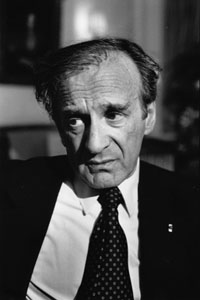Elie Wiesel
Elie Wiesel (1928–2016) was a Romanian-born American writer, professor, political activist, Nobel Laureate, and Holocaust survivor. He is best known for his memoir, Night, in which he recounted his experiences surviving the Holocaust as a teenager. Wiesel's work is a major contribution to Holocaust literature and has played a significant role in Holocaust education worldwide.
Early Life[edit | edit source]
Elie Wiesel was born on September 30, 1928, in Sighet, Transylvania, which was then part of Romania and is now in Romania. He was the third of four children in a devout Jewish family. In 1944, when Wiesel was 15 years old, he and his family were deported by the Nazi regime to the Auschwitz concentration camp. His mother and the youngest sister were killed upon arrival, and his father died before the camp was liberated.
Literary Career[edit | edit source]
After the war, Wiesel studied in Paris and later became a journalist. His first book, Night, was published in 1956. It is a work of about 100 pages describing his experiences and those of his father in the Nazi camps at Auschwitz and Buchenwald during the final year of World War II. Night is considered one of the bedrocks of Holocaust literature and has been translated into over 30 languages.
Wiesel went on to write more than 60 books, including novels, essays, and plays. His writing deals primarily with themes of the Holocaust, faith, Judaism, memory, and morality, and has garnered numerous awards, including the Nobel Peace Prize in 1986, where he was called a "messenger to mankind" for his role in speaking out against violence, repression, and racism.
Activism[edit | edit source]
Beyond his literary contributions, Wiesel was an active advocate for human rights. He spoke out against injustices and atrocities around the world, including in South Africa, Nicaragua, Kosovo, and Darfur. He was appointed as chairman of the President's Commission on the Holocaust (later the United States Holocaust Memorial Museum) by President Jimmy Carter in 1978 and won the Congressional Gold Medal in 1985.
Death and Legacy[edit | edit source]
Elie Wiesel passed away on July 2, 2016, in New York City. His death was mourned worldwide as the loss of a powerful voice against hatred and for the memory of the Holocaust. His literary and humanitarian legacy endures, inspiring generations to remember the past and to act with empathy and justice.
Wiesel's life and work are a testament to the resilience of the human spirit in the face of the darkest evils. His writings continue to be essential reading for those who seek to understand the Holocaust and its impact on humanity.
Search WikiMD
Ad.Tired of being Overweight? Try W8MD's physician weight loss program.
Semaglutide (Ozempic / Wegovy and Tirzepatide (Mounjaro / Zepbound) available.
Advertise on WikiMD
|
WikiMD's Wellness Encyclopedia |
| Let Food Be Thy Medicine Medicine Thy Food - Hippocrates |
Translate this page: - East Asian
中文,
日本,
한국어,
South Asian
हिन्दी,
தமிழ்,
తెలుగు,
Urdu,
ಕನ್ನಡ,
Southeast Asian
Indonesian,
Vietnamese,
Thai,
မြန်မာဘာသာ,
বাংলা
European
español,
Deutsch,
français,
Greek,
português do Brasil,
polski,
română,
русский,
Nederlands,
norsk,
svenska,
suomi,
Italian
Middle Eastern & African
عربى,
Turkish,
Persian,
Hebrew,
Afrikaans,
isiZulu,
Kiswahili,
Other
Bulgarian,
Hungarian,
Czech,
Swedish,
മലയാളം,
मराठी,
ਪੰਜਾਬੀ,
ગુજરાતી,
Portuguese,
Ukrainian
Medical Disclaimer: WikiMD is not a substitute for professional medical advice. The information on WikiMD is provided as an information resource only, may be incorrect, outdated or misleading, and is not to be used or relied on for any diagnostic or treatment purposes. Please consult your health care provider before making any healthcare decisions or for guidance about a specific medical condition. WikiMD expressly disclaims responsibility, and shall have no liability, for any damages, loss, injury, or liability whatsoever suffered as a result of your reliance on the information contained in this site. By visiting this site you agree to the foregoing terms and conditions, which may from time to time be changed or supplemented by WikiMD. If you do not agree to the foregoing terms and conditions, you should not enter or use this site. See full disclaimer.
Credits:Most images are courtesy of Wikimedia commons, and templates, categories Wikipedia, licensed under CC BY SA or similar.
Contributors: Prab R. Tumpati, MD





